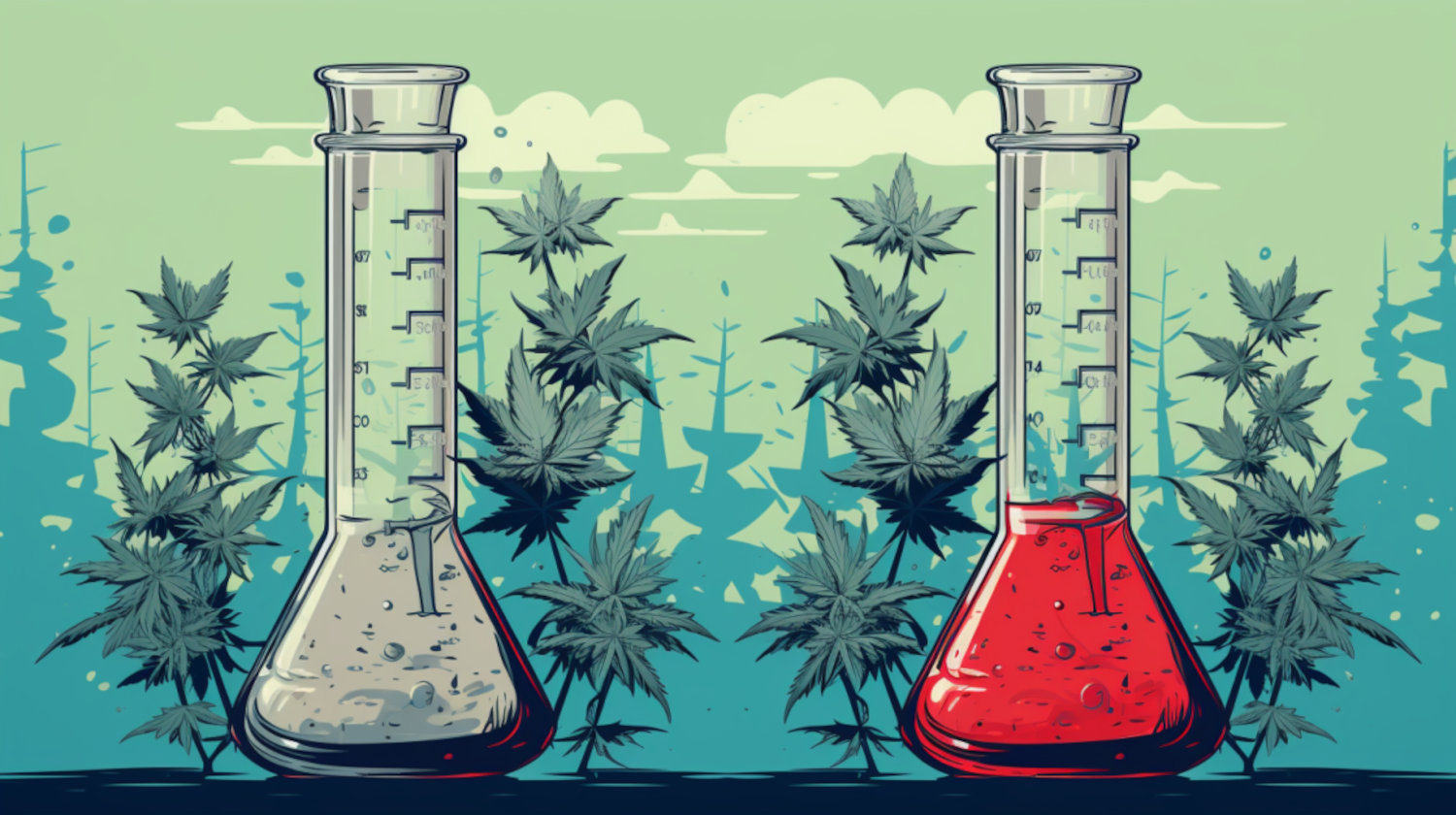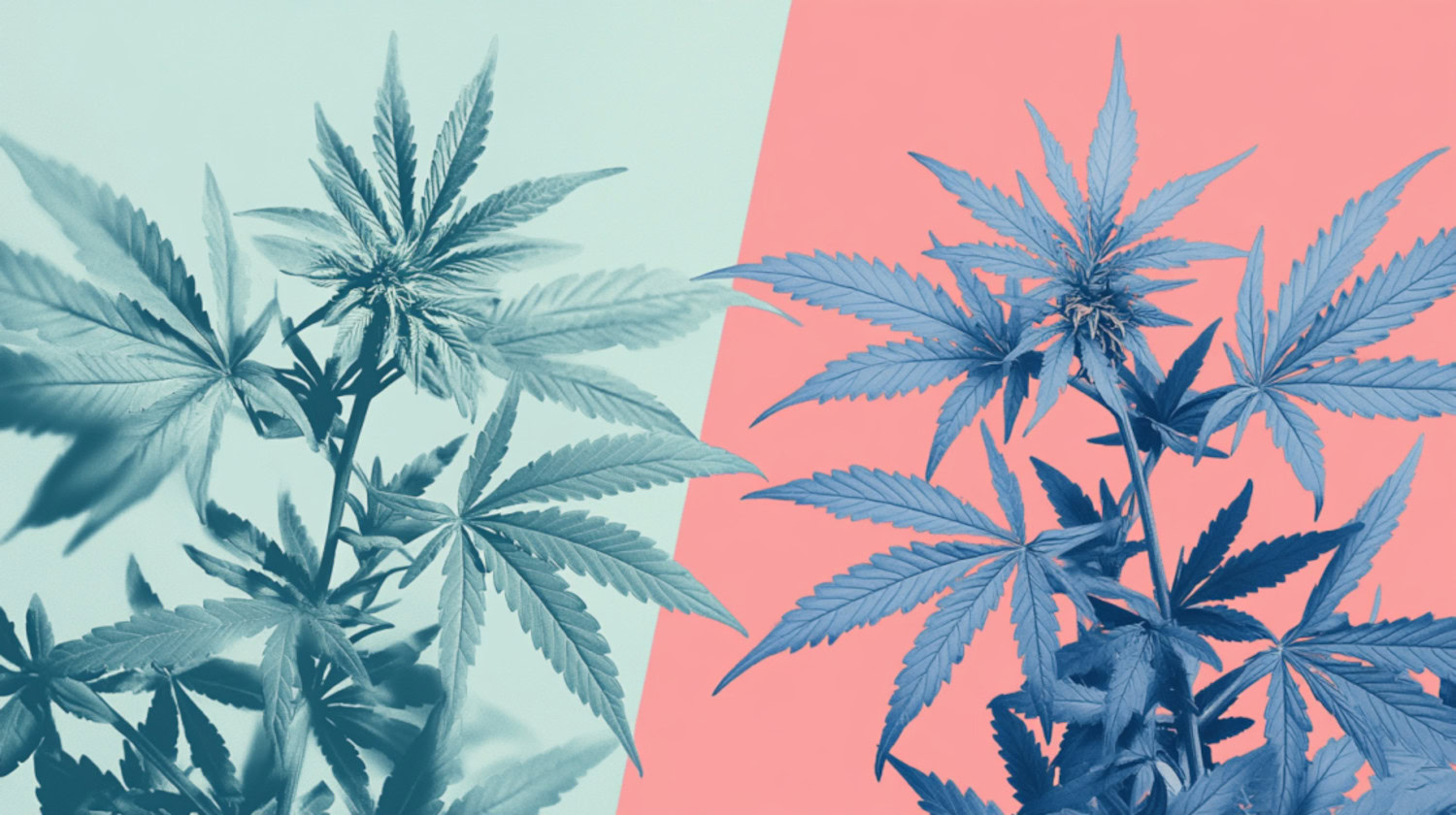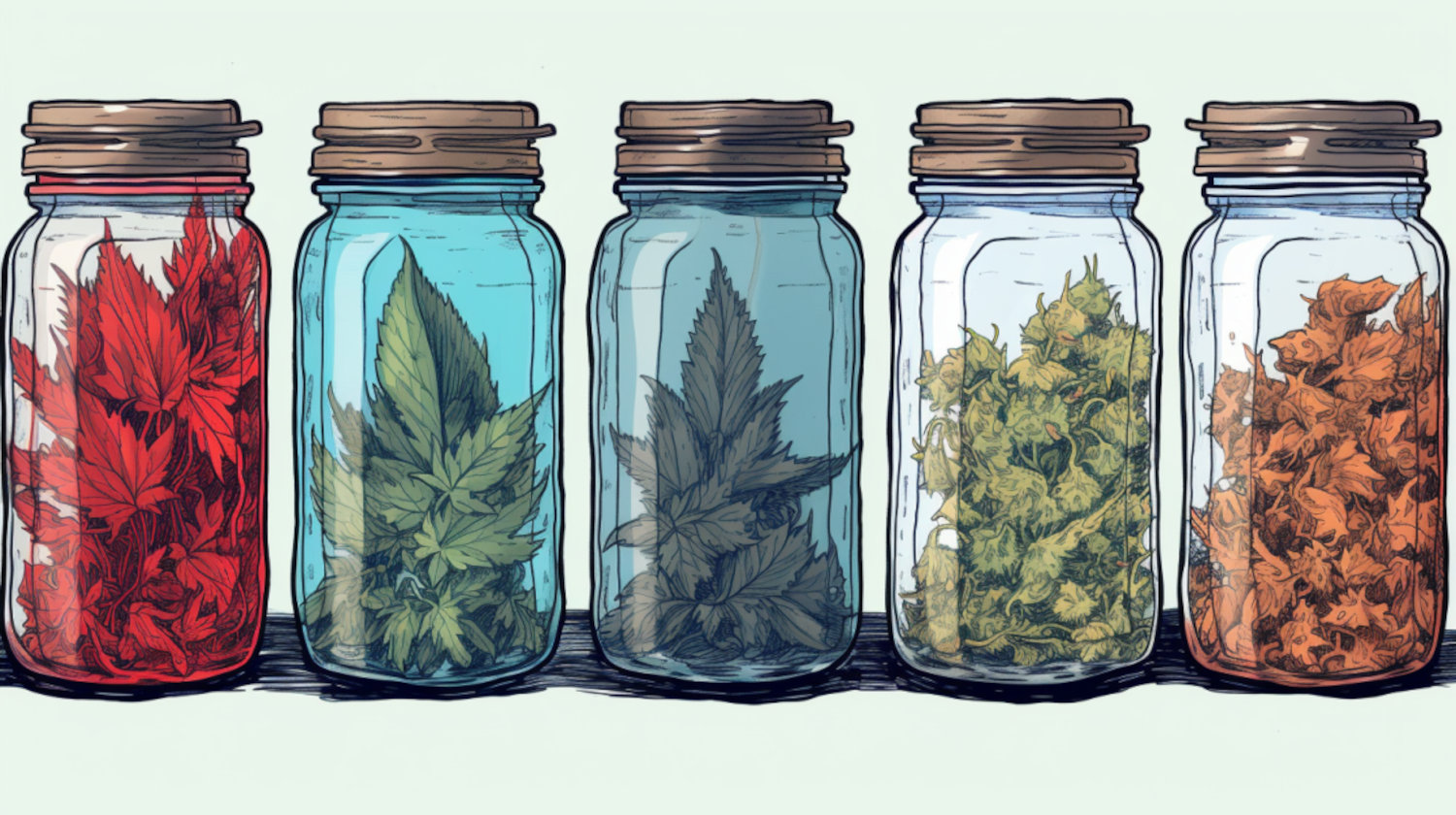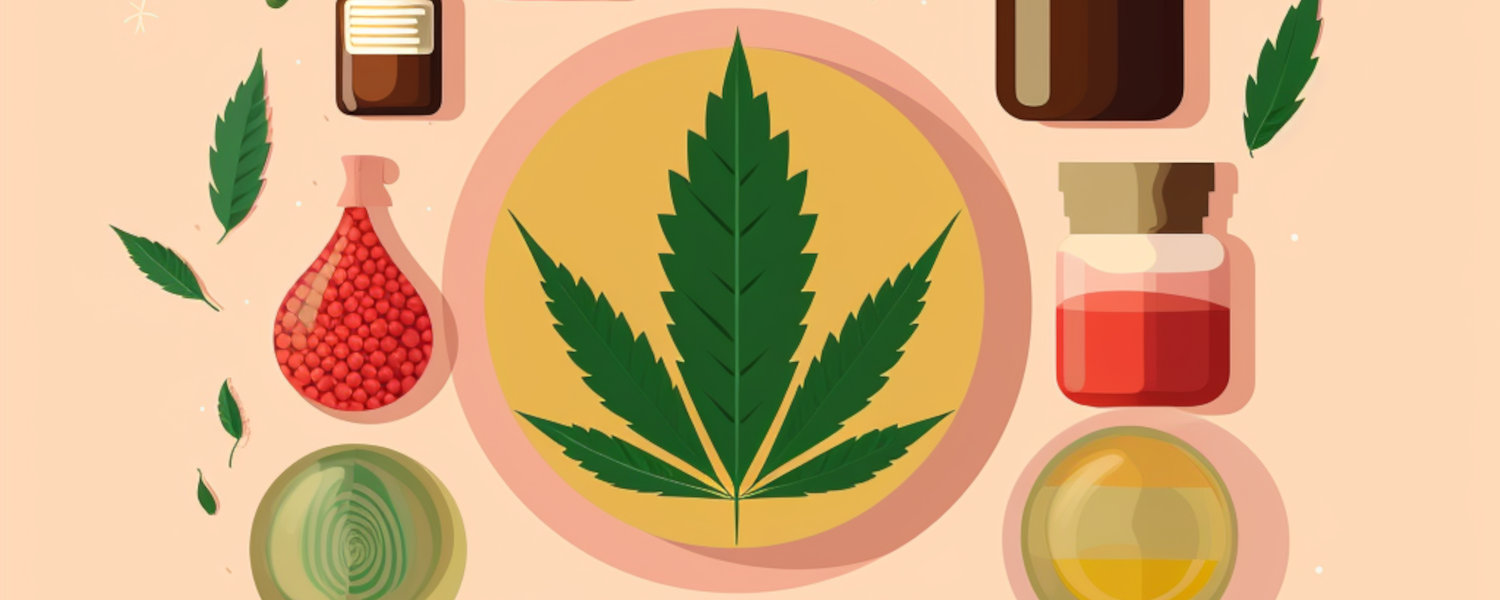In This Article
- What is HXC?
- What is THC?
- Comparing Their Effects
- Interaction with the ECS
- Potency and Effects
- Risks and Benefits
- HXC and THC: Legality and Availability
- Legality of THC
- Legality of HXC
- Availability and Accessibility
- What Types of HXC and THC Products Are Available?
- THC Products
- HXC Products
- A New Era for Cannabis
- References
The cannabis plant is a rich source of various cannabinoids, each with unique properties and effects. Among these, tetrahydrocannabinol (THC) and cannabidiol (CBD) stand out as the most well-known and abundant, widely recognized for their intoxicating and potential medicinal benefits.
However, the recent emergence of hexahydrocannabinol (HXC) alongside other newer cannabinoids is drawing increasing attention. The best way to understand the HXC vs THC debate is to compare these cannabinoids, focusing on their effects, benefits, and potential risks.
What is HXC?
HXC, also known as HHC (hexahydrocannabinol), is a cannabinoid that has recently garnered significant interest from the cannabis community. Although HXC occurs naturally in the cannabis plant, its concentrations are so low that commercially available HXC is produced in a semi-synthetic manner. This production often involves deriving HXC from CBD, placing it in a legal gray area similar to that of delta-8 THC.
The emergence of HXC traces back to its initial scientific documentation in the 1940s, with its popularity increasing as it became more accessible in the market. However, this recent increase in availability contrasts with the limited clinical studies on how HXC affects the body.
Research to date suggests that HXC has a chemical structure similar to THC, but the specifics of its interaction with the endocannabinoid system and overall effects are still being explored.1 Early studies, including animal research from 1977, indicate that HXC might have pain-relieving properties, but comprehensive human studies are lacking.2
The distinction between the meaning of HXC and HHC is more a matter of naming than a difference in substance; they refer to the same cannabinoid. This rebranding by certain companies has led to some confusion, but there is no chemical difference between HXC and HHC.
Regarding its effects, HXC is believed to interact with the body's endocannabinoid system similarly to THC, but its exact potency, effects, and safety profile are not as well-established. Some anecdotal accounts suggest HXC might produce effects comparable to THC, such as boosting appetite, aiding in pain relief, and assisting with sleep. Still, it's often reported to be less potent.3
The presence of different isomers, such as (9R)-HHC and (9S)-HHC, during its conversion process, could lead to varying activities at the cannabinoid receptors, further complicating its understanding.4
What is THC?

THC, or tetrahydrocannabinol, is the most renowned cannabinoid produced by the cannabis plant, primarily known for its intoxicating effects. It belongs to a larger group of chemical compounds called cannabinoids, which includes over 100 known varieties, but THC and CBD are the most prominent.
Discovered in the 1960s, THC was the first cannabinoid to be isolated, spearheading the scientific exploration of cannabis. It's a natural component of the cannabis plant, secreted by glands around its flowers. THC's role in the plant is theorized to be part of its defense mechanism, but its exact purpose remains a subject of research.5
In the human body, THC interacts with the endocannabinoid system, which plays a vital role in regulating functions like immune response, appetite, and cell communication. THC affects the body by mimicking the body's endogenous cannabinoids, particularly anandamide, thereby altering normal neurotransmission. This interaction primarily occurs at the CB1 and CB2 cannabinoid receptors, leading to various physiological effects.6
The effects of THC are most pronounced in the brain, influencing areas responsible for memory, pleasure, coordination, and time perception. This results in the well-known "high" of cannabis, characterized by euphoria, altered sensory experiences, and, in some cases, relief from symptoms like pain and nausea. However, THC can also produce less desirable effects, such as anxiety, paranoia, and impaired cognitive functions, varying greatly between individuals and consumption methods.
THC has been used both recreationally and medicinally for thousands of years. The modern understanding of THC's role in medical treatments is still evolving, with research indicating potential benefits in conditions like chronic pain, insomnia, and nausea. However, further clinical studies are necessary to understand THC's therapeutic potential fully.
Comparing Their Effects
While THC has long been recognized for its intoxicating properties and potential medicinal benefits, HXC is a newer cannabinoid that's begun to make waves in the cannabis community. Understanding how they differ in terms of effects, potency, and potential therapeutic uses is crucial for medical and recreational users.
Interaction with the ECS
Both HXC and THC interact with the endocannabinoid system, but their interactions and effects differ. THC is known for its strong affinity for CB1 receptors in the brain, leading to the intoxicating effects commonly associated with its use. It mimics the action of endogenous cannabinoids and can alter mood, perception, and cognition.
HXC, while chemically related to THC, has a distinct interaction profile. The extent to which HXC binds to cannabinoid receptors and its overall impact on the endocannabinoid system is still under investigation. Preliminary findings suggest similarities to THC but with potentially different potency and effects.
Potency and Effects
THC is renowned for its potent intoxicating effects. Users commonly experience euphoria, altered sensory perceptions, and, in some cases, medicinal benefits like pain relief and nausea reduction. However, THC can also lead to adverse effects such as anxiety, paranoia, and impaired cognitive functions, especially at higher doses.
HXC, in contrast, is suggested to have effects that might be similar to THC but potentially with a different potency. The specifics of how potent HXC is compared to THC are still being studied. Early anecdotal reports suggest HXC's effects could be less potent than THC, but more research is needed to confirm these claims.
Risks and Benefits
Both cannabinoids carry potential risks and benefits. THC's benefits are more documented, with many people using it for pain relief, appetite stimulation, and managing conditions like nausea, insomnia, and certain mental health disorders. However, the risks include the possibility of developing cannabis use disorder, experiencing acute psychological effects, and potential long-term cognitive impacts, especially among heavy users.
As a newer subject in cannabinoid research, the benefits of the HXC cannabinoid are not yet fully understood. Preliminary reports suggest it may share some of THC's potential therapeutic properties, such as pain relief and euphoric effects, but without the intensity of THC's intoxication. Additionally, because HXC products are relatively new and less regulated, there could be concerns about product purity and consistency.
Users should exercise caution, particularly given the uncertainty about how HXC affects the human body. The possibility of contaminants and synthetic by-products in HXC products also poses potential health risks, as does the presence of heavy metals from the catalyst used in its hydrogenation process.
HXC and THC: Legality and Availability

The legal landscape for cannabis and its derivatives, including THC and HXC, varies significantly across different regions and is subject to ongoing changes.
Legality of THC
THC, the most well-known intoxicating cannabinoid in cannabis, has seen a shift in its legal status in recent years. In several countries and states, especially within the United States, THC has been legalized or decriminalized for medicinal use and, in some cases, for recreational use as well.
However, it remains a controlled substance under federal law in the U.S. and in many other countries, restricting its legal availability. The legality of THC directly impacts its accessibility, with it being readily available in regions where it's legal, typically through licensed dispensaries that ensure product quality and safety.
Legality of HXC
HXC is newer on the scene, and its legal status is unclear. It often falls into a legal gray area, similar to other semi-synthetic cannabinoids like delta-8 THC.
In some jurisdictions, HXC's legal standing is tied to its source – if derived from hemp with less than 0.3% THC, it may be considered legal under the 2018 Farm Bill in the United States. However, this interpretation varies, and the lack of explicit legal recognition for HXC creates uncertainty around its availability.
Availability and Accessibility
Their legal status heavily influences the availability of both THC and HXC. THC products are widely available in regions where cannabis is legalized, either for medical or recreational use. These products are typically sold in licensed dispensaries, where their quality and THC content are regulated.
On the other hand, HXC's availability is more limited and less regulated due to its ambiguous legal status. It may be found in some online stores or specialty shops, particularly in areas where hemp-derived products are legal.
However, the lack of stringent regulations can lead to product quality and potency inconsistencies. Consumers looking to purchase HXC products should exercise caution and ideally seek products that provide independent lab testing results to ensure their safety and quality.
What Types of HXC and THC Products Are Available?

The cannabis industry has expanded dramatically, offering a diverse range of products containing THC and HXC. Each cannabinoid's product range reflects its legal status, consumer demand, and application.
THC Products
- Flower: The traditional form of cannabis used for smoking.
- Edibles: Products like gummies, chocolates, and baked goods infused with THC.
- Concentrates: High-potency forms such as oils, waxes, and shatters, used for vaping or dabbing.
- Tinctures: Liquid extracts that are typically administered under the tongue.
- Topicals: Creams and balms are used for external applications and often for localized pain relief.
- Capsules and Pills: For those who prefer a more traditional medicinal form.
- Beverages: Infused drinks that offer a different consumption experience.
HXC Products
HXC, being relatively new and less regulated, has a narrower range of products compared to THC. However, as its popularity grows, so does the variety of HXC-containing products. These often include:
- Vapes: Cartridges containing HXC oil are popular for convenience and discreetness.
- Edibles: Similar to THC, though less common, edibles like gummies or chocolates infused with HXC.
- Tinctures and Oils: For sublingual use or incorporation into foods.
A New Era for Cannabis
While THC remains a familiar staple with its diverse applications, HXC emerges as an exciting new cannabinoid, hinting at untapped potential. As the cannabis industry evolves, staying informed and cautious is critical. The future of cannabinoids like HXC and THC is bright and full of discovery, promising new avenues for both therapeutic use and personal enjoyment.
References
- Collins AC, Ramirez GA, Tesfatsion TT, Ray KP, Caudill S, Cruces W. Synthesis and characterization of the diastereomers of HHC and H4CBD. Natural Product Communications. 2023;18(3). doi:https://doi.org/10.1177/1934578X231158910 ↩︎
- Bloom AS, Dewey WL, Harris LS, Brosius KK. 9-nor-9beta-hydroxyhexahydrocannabinol, a cannabinoid with potent antinociceptive activity: comparisons with morphine. J Pharmacol Exp Ther. 1977;200(2):263-270. ↩︎
- Graziano S, Varì MR, Pichini S, Busardo FP, Cassano T, Di Trana A. Hexahydrocannabinol Pharmacology, Toxicology, and Analysis: The First Evidence for a Recent New Psychoactive Substance. Curr Neuropharmacol. 2023;21(12):2424-2430. doi:10.2174/1570159X21666230623104624 ↩︎
- Russo F, Vandelli MA, Biagini G, et al. Synthesis and pharmacological activity of the epimers of hexahydrocannabinol (HHC). Sci Rep. 2023;13(1):11061. Published 2023 Jul 8. doi:10.1038/s41598-023-38188-5 ↩︎
- Crocq MA. History of cannabis and the endocannabinoid system. Dialogues Clin Neurosci. 2020;22(3):223-228. doi:10.31887/DCNS.2020.22.3/mcrocq ↩︎
- Martin-Santos R, Crippa JA, Batalla A, et al. Acute effects of a single, oral dose of d9-tetrahydrocannabinol (THC) and cannabidiol (CBD) administration in healthy volunteers. Current pharmaceutical design. 2012;18(32):4966-4979. doi:https://doi.org/10.2174/138161212802884780 ↩︎
The information in this article and any included images or charts are for educational purposes only. This information is neither a substitute for, nor does it replace, professional legal advice or medical advice, diagnosis, or treatment. If you have any concerns or questions about laws, regulations, or your health, you should always consult with an attorney, physician or other licensed professional.




